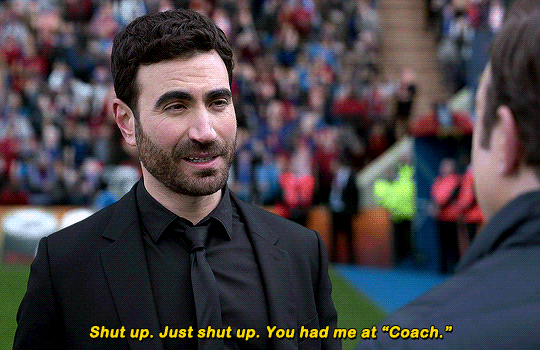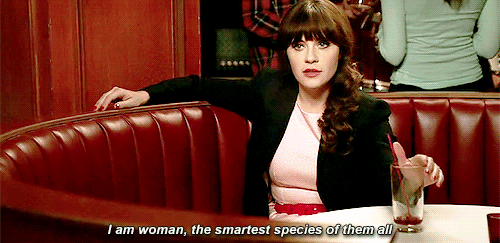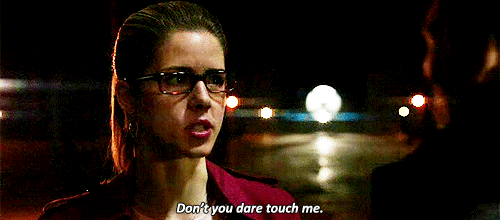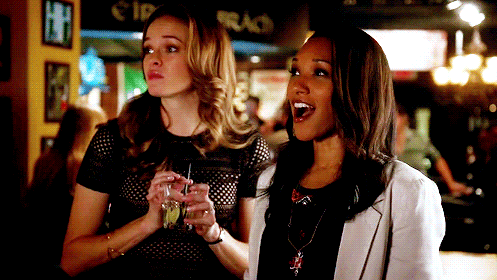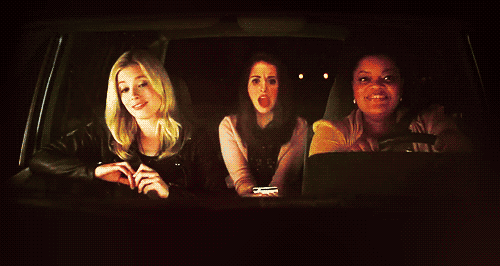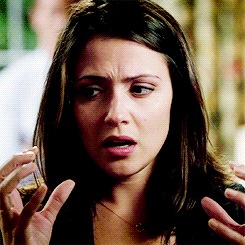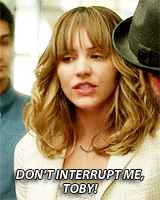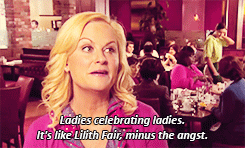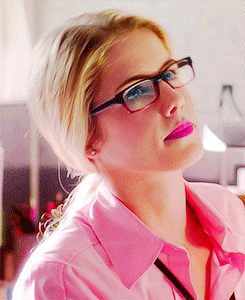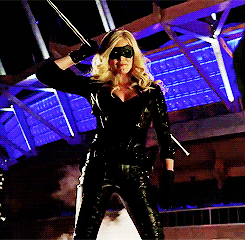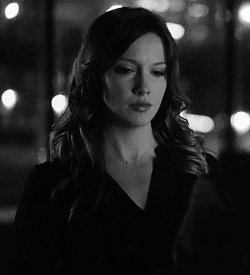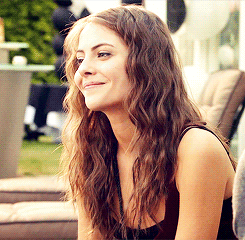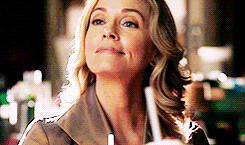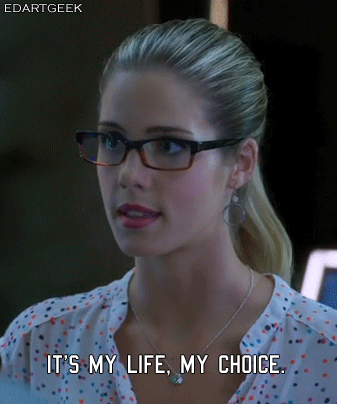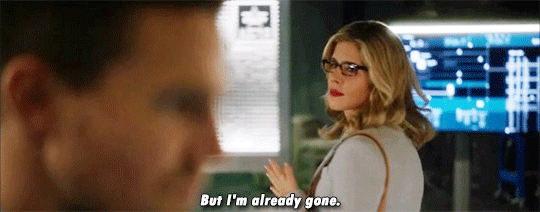
But recently, there was a commenter on my Arrow review who talked about how she — yes, she — “hates most hate most women characters on TV.” This commenter then goes on to call female characters “nasty,” “ditzy,” “petty,” “heavily dependent,” “whiny,” “indecisive,” and “catty.” The commenter concludes with this statement: “Real women are not like this.”
Now, setting aside my complete and utter bewilderment that a woman like this actually exists and believes the vitriol she’s typed, that final part of her statement is one that really made for some beautiful irony. Of course real women are like that! Of course each and every one of us has been indecisive about something. We’ve all been catty (I’m saying this as a woman, because I know it’s true of myself — and I try not to be!). We’ve all whined, we’ve all depended on someone else — be it man, woman, friend, parent, loved one, etc. — to compliment us. We have all craved that human acceptance. And yet, for some reason, this commenter believes that real women are not flawed; and that TV characters who are or who make decisions that go against a standard “norm” are useless and worthless.
Moreover, she believes so strongly in this idea that women can only be valuable if they’re on The Walking Dead that she repeatedly uses language to tear other women down. Because this person did not believe in the decision that Felicity Smoak made in “Broken Hearts,” she demonstrated something extremely dangerous: internalized misogyny. Because a female character did something that this commenter disagreed with, she took it as permission to dismiss an entire gender. Apart from the fact that this person is clearly very confused and her remarks become less and less sensible with every word she types, I suspect that she’s not alone in her beliefs. I suspect that because I’ve seen it happen more and more recently in fandoms.
So let’s talk about female characters and, in particular, one character named Felicity Meghan Smoak. Because apparently it’s come to the point in 2016 in which I need to.
FEMINISM DOESN’T MEAN YOU HAVE TO LIKE EVERY FEMALE CHARACTER
There’s this startling idea that flits about fandoms, and it’s the notion that in order to be a feminist, you have to like every female character or — at the very least — you have to like them equally. And that’s simply not true. You don’t have to like Felicity Smoak. You don’t have to like Kara Danvers. You don’t have to like Clara Oswald or Abbie Mills or Rebecca Bunch or Olivia Pope or Alex Parrish or Clarke Griffin. Feminism doesn’t mean that every female you come across is inherently on everyone’s “good” list simply because they’re a female.
That’s why writing is so important.
After the little comment-fest on my Arrow review, I further solidified my belief that feminism is the radical idea that women are people — human beings – and deserve to be treated as such. They’re not footstools for men. They’re not emotional punching bags. They’re not pretty props to stand in the background and decorate a scene. They’re not meant to be one half of a ship, or a tool by which to further a male character’s growth. Female characters on television have value because they are PEOPLE. And it is the writers’ jobs on any television show in order to tell their story truthfully and well; just as well, in fact, as they would tell a male character’s story.
That’s where a lot of shows have been stumbling, if we’re really being honest. It’s not always the fault of the female character — it’s the fault of the writer for writing them badly. That is precisely why I so vehemently disliked Clara Oswald in this recent season (really, two seasons) of Doctor Who: the writers threw every shred of character development that made her so endearing, so strong, and so important out the window. They made her regress and become absolutely unbearable and erratic in the way she responded to people and situations. She became emotionally manipulative in her relationship with Twelve (to the point where I was legitimately concerned for people shipping them because of the levels of toxicity present), and the character became absurd and wildly out-of-character given everything we had known of her up until that point.
When the writing of women is bad, it's the characters who suffer.
In this circumstance, did I like Clara Oswald? Absolutely not. The way that she was written was appalling, and her characterization suffered. Am I a bad feminist because I dislike her? Nope. I don’t hate Clara because she’s a woman — I hated her, in the end, because the writers took a beautiful, intelligent young woman and turned her into nothing more than a prop in a relationship and a “twist” in a shoddy story. That’s a reason to get mad, friends! When the writing of women is bad, it’s the characters who suffer.
Disliking a female character is totally okay. But what’s not okay is spewing vitriol or supporting the degradation of them in celebration of a male.
And I think that’s what has bugged me so much about supporters of Oliver in this “baby mama drama” arc on Arrow. For the most part, I’ve seen pretty tame responses and reactions to his characterization and to Felicity’s response, especially after “Broken Hearts.” (I think mainly staying out of the catacombs of the fandom has helped me not lose my entire faith in humanity.)

But I’ve, just recently, literally seen tweets and Tumblr posts and review comments saying that Felicity deserves to apologize to Oliver for the way she behaved — that she should stop being so “whiny” or acting like a “bitch.” Essentially, with this reply, fans are claiming that it is irrational and unacceptable for a woman to express her emotions to a man and for her to make a decision that supports her emotional well-being over his. It’s okay for a man to walk away from a relationship with a woman, but if a woman makes the decision to walk away from a man, all hell breaks loose.
Because essentially what all of these commenters, reviewers, and apparent human beings are saying is that women, in this instance, are supposed to shut their mouths, look pretty, occasionally say some funny lines, and agree with everything the male says and how he treats her. THAT is what is detrimental to feminism, friends, and it’s this kind of thinking that is exceptionally dangerous. Because I understand that there are reasons Oliver lied to Felicity. I get that. I’m not stupid.
However, what I don’t understand is why his lies don’t deserve consequences when the lies of everyone else on this show (and in real life) have actual, lasting consequences.
If you lied to the police, withholding evidence that could help in a vital case, you would be tampering with an investigation. Your decision to withhold something is a conscious one, and it would have an impact on your life and the lives of those around you. Only a person who is out of their mind would say that they didn’t deserve a consequence or some form of punishment for their behavior. And yet, when male characters on television mess up, it’s the women who suffer the wrath of the Internet commenters and the misogynists who think that their role is subservient to the role of a man.
Could Felicity have stayed with Oliver? Sure, she could have. Would that have been in-character with everything we know to be true about her? No. Felicity has proven time and time again that she values honesty. And up until this baby mama drama, Oliver has messed up on occasion and lied, but has always proved his loyalty to her when it mattered. He trusted her; she was his partner, after all. But now, Oliver has a child that he hides from Felicity. Not only that, but he has this entire other piece of his life — a pretty giant piece, mind you — that Felicity is shut out of intentionally.
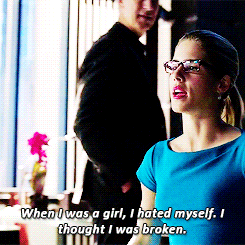
So think about it this way: you’re in a relationship with someone. You live together. You love this person and are about to marry them. But then you find out they have a child they didn’t tell you about. Moreover, your partner has told other people about this child before they told you. And after you learn of this child, your partner expresses the fact that they want you to be in the loop — they want you to be a part of every piece of their life and the child’s life. So you are still angry at the betrayal, but maybe your heart softens just a bit at this openness and total honesty about being included. That is, until you walk in on your partner making a decision about this child and not — once again — telling you in any way, shape, or form. You didn’t need to be making a decision with him, or holding his hand as he did. He didn’t need to ask your permission. You didn’t need to have any say in this child’s future.
All you needed from your partner was the assurance that you matter enough to him or her that they would tell you about this other big piece of their life — that they trusted you enough to tell you what was going on in their mind and heart.
So how might you feel, then, after discovering this slight? A bit stung and hurt? Betrayed? Manipulated?
That’s exactly how Felicity felt when she walked in on Oliver creating a tape for William without even mentioning it to her. “How much of that did you hear?” he asks, wearily, because once again Oliver has said Felicity is the most important thing to him, but keeps rebuffing her and pushing her aside as if she’s a nuisance, not a partner. Oliver waxes poetic about Felicity being the one he trusts most and his eternal partner, but that’s not really true at this point. The only person Oliver completely and totally trusts is himself. And you know what? Sometimes Oliver shouldn’t trust himself or his instincts. Because sometimes they’re just plain bad. But instead of inviting Felicity into a big part of his life — instead of showing her that she’s his partner rather than telling her — he shuts her out.
It’s like Oliver is holding out a set of keys to Felicity, and telling her that she has his whole trust and his whole future and his whole life... but he’s not loosening his grip on one key. You can’t really have someone’s complete and total trust if you’re constantly holding a key back from them. “Everything else you can have,” Oliver is essentially telling Felicity. “... But I can’t trust you with this.”
Ouch.

WHY WOMEN WHO EXPRESS EMTOIONS AREN’T WHINY
I express emotions by crying. A lot. I’ll cry at a great commercial (those of you who live in the southeast United States and have seen Publix commercials? Yup. They get me nearly every time), a cheesy rom-com, or a really powerful television scene. Thank goodness that not once in my life has someone seen me crying, walked up to me, pointed to my tears and said: “Stop whining. You can’t be a strong woman anymore if you do that.”
There’s this really weird, really problematic idea that people hold in their hearts and it’s that a strong woman is someone who doesn’t break down, who’s never scared, and who fearlessly faces zombies or monsters or evil villains with whatever weapon she’s proficient at. This is a problematic mindset, if you couldn’t tell, because it reduces women to physicality. It emphasizes one “strength” of a woman.
Let me ask you all something: is your favorite male character strong because of his physique? Is Captain America a hero because he has a cool shield? Are Superman and Batman heroic because of their costumes? Does Oliver Queen beg for us to like him and relate to him and care about him because he’s really good at shooting arrows into people? Of course not. That would be absurd. We care about these male characters because they embark on the typical hero’s journey, and they become better people, more resilient, and well-rounded because of it.
Well-rounded people — and well-rounded female characters — are not one-note. That’s literally the definition of well-rounded: “varied or balanced.”
But when Felicity Smoak expresses emotion on Arrow, suddenly she cries too much. She complains too much. “She should just be happy,” I’ve heard some people reason, “that she’s even there.” Well-rounded people — and well-rounded female characters — are not one-note. That’s literally the definition of well-rounded: “varied or balanced.” A character cannot be one thing all of the time. Imagine Arrow with John Diggle only bellowing his lines in anger. Apart from doing a number on David Ramsay’s voice, we would lose a lot of what makes Diggle such a great character — his compassion, his wisdom, his sarcasm — if he was simply angry!Diggle all the time.
And the same is true of female characters.
I don’t think they want to admit it, but the people who are calling Felicity names and who are irritated by the way she made an adult decision in walking away from a relationship in which she felt she was being mistreated (which, by the way, if you’re being mistreated in a relationship, you don’t owe ANYONE an excuse for walking away from something you feel is harming you) like their Felicity Smoak one-dimensional. They like her as the quirky blonde IT girl who wears pretty dresses and makes innuendos. Once Felicity begins making her own decisions — ones that counteract what a male decides for her — these people are appalled. How dare a woman tell Oliver off. How dare she walk away from a team that supported her. How dare she have an opinion of her value and her worth that contradicts Oliver’s.
How dare she. Really.
Here’s something that I briefly touched upon a few sentences ago: Felicity walks away from this relationship because she feels it is harming her more than it is helping her. I’ve known some people in real life who were able to forgive a partner who cheated, move on, and heal from that betrayal while remaining in the relationship. I know some people who cannot do that either because their partner is unwilling to change or they, themselves, are unable to heal from the wound that infidelity caused. Who is right in this circumstance: the person who stayed, or the one who walked away?
She needs to heal, and healing — in this instance — means walking away. And that’s okay, because it is HER decision and one that she did not take lightly.
Time’s up! The answer is BOTH. Both people did what they believed was best for them and their relationship. Some relationships can survive betrayals of trust like that and emerge stronger, as long as both parties are willing to compromise. Some cannot. Oliver is not willing yet to open back up his heart and trust to Felicity, and Felicity isn’t going to sit around, twiddling her thumbs, continuing to be lied to and kept out of the loop simply because Oliver says things will be different. She needs to heal, and healing — in this instance — means walking away. And that’s okay, because it is HER decision and one that she did not take lightly. She’s not being vindictive here. She’s not saying: “You hurt me, so I’m going to hurt you right back.”
She’s telling Oliver that in order to win back her trust, he’s going to need to prove he wants it, not with words but with actions. And it would be immensely cruel of her to be at his side, every single day, when he still loves her and she loves him. So she’s erasing herself from the narrative for now. And when she’s ready to reinsert herself into Oliver’s life, she will. But not until he proves that he deserves it.
Just like Eliza Hamilton made the decision in the musical Hamilton to put herself back in the narrative, so will Felicity Smoak. But it will be HER decision to make.
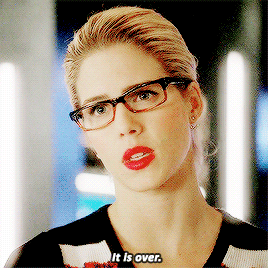
WOMEN DESERVE AGENCY. PERIOD.

The one positive thing that I will say about this whole horrendous “baby mama drama” on Arrow is that it gave Felicity agency. It didn’t strip her of her free will. The show may have done Felicity wrong in ways this season and last, but it let HER be the one to decide her fate. A decision wasn’t forced upon her. She wasn’t just the object of someone’s lie. She was the active participant, not a passive piece of scenery.
The moment that women make their own decisions in narratives rather than stories and things just happening to them, a section (surprisingly large) of people suddenly become annoyed. The character goes from being “strong” to “irritating,” or from “awesome” to “whiny.” Women don’t always make the right decisions. And that’s okay. I don’t agree with a lot of what Laurel Lance has done in the last few seasons. Do I think that she deserves to have the agency to make her own decisions, whether great or horrible? Yes. Absolutely. Laurel gets a lot of flak from the fandom. And I admit that I’m not always her greatest fan.
But I actually do appreciate her.
Because no matter how many times this woman gets knocked down, she’s stubborn and resilient and will keep picking herself back up. She’s often brash and irrational in the way that she does things. She can be reckless and selfish and you know what? That’s awesome. We need all kinds of female characters — from the ones who are selfless, to ones who are selfish; we need women who are snappy and witty and those who are gentler. We don’t need an entire show of Felicity Smoaks because not EVERY woman is like Felicity. Some women relate extremely well to Laurel. I, in fact, relate to the aspect of her character who is a big sister. That’s something that I connect with when it comes to her. I can’t relate to Felicity in this regard because she’s not a sibling or a protective older sibling. I am.
So we need women who break down and who get angry and who cry. We need women who kiss and who hug and who love with their whole hearts. We need women who are stubborn and selfish, ones who will kick and scream until the world listens to them.
So we need women who break down and who get angry and who cry. We need women who kiss and who hug and who love with their whole hearts. We need women who are stubborn and selfish, ones who will kick and scream until the world listens to them. We need women like this because women on television should reflect women in real life. So we need women of all ages, ethnicities, sexual orientations, religious beliefs, economic circumstances, and familial backgrounds on television. Why? Because if there are women we see in our everyday lives who aren’t reflected on television, then how will we relate to or connect with those stories? How will they resonate and permeate our hearts fully?
I don’t always connect with Laurel or Thea, but last year I didn’t always connect with Felicity. I can’t relate personally to Rebecca Bunch and her antics, but I can feel her pain as if it was my own. I love Kara Danvers and I love Jessica Day. I don’t know how I feel about Elektra on Daredevil or Julia on The Magicians yet.
Women are valuable because they’re human beings.
But I see every female character as something special, not because I will love every single one of them, but because somewhere in the world, that character is representative of a young woman watching television or powering on her laptop. Women are valuable because they’re human beings. We don’t always say or do the right things. Sometimes we’re really, really good at giving advice and sometimes we’re really bad. Sometimes we have snappy retorts, and sometimes we stay quiet. Sometimes we whine, we stomp our feet, and sometimes we valiantly go to (literal or metaphorical) war. We can be catty and petty at times, but we can also be extremely loving and gracious and loyal. We were not created by God to prop up man; we were created to walk side-by-side with him as his equal and his partner. We are not inferior. We are not dismissible. We are not here for you to objectify, and we’re certainly not here for you to toss your emotional baggage onto and expect us to silently suffocate beneath the weight of your issues.
We are strong not because of the weapons we wield, but because of the ways we encounter circumstances and make difficult decisions and prevail, in spite of odds and obstacles.
We’re women.
Respect us.

